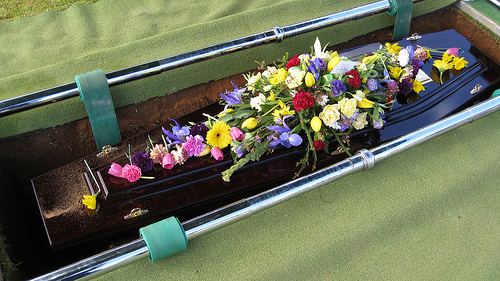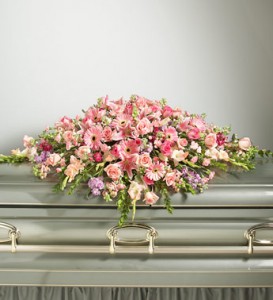Funeral Etiquette for the Bereaved
Funeral Etiquette for
Sympathizing with the Bereaved
The death of a close friend or family member is almost certainly the most difficult event that a person will experience. Observing appropriate funeral etiquette in terms of our words and actions is very important, although it can be hard for us to know exactly what to say and how to act when someone close to us has lost a loved one.
What to Do
Upon hearing of the death:
- Acknowledge it in whatever way feels most appropriate. Even a short, simple phone call is preferable to taking no action at all to try and comfort the deceased person’s family.
- If you are a very close friend of the family, it is a good idea to visit them. If you are a little more distant, sending funeral flowers or a sympathy card may be more suitable.
- Offer to help in a practical manner, such as volunteering to cook meals for the family or helping to dig the grave.
At the funeral:
- Only visit the funeral home during the times specified in online obituaries.
- If attending the funeral service, arrive in plenty of time. Walking in late to the service is very disrespectful.
- Put your mobile phone on silent or, better still, switch it off completely until you have left the funeral home or place of worship.
- Do not bring small children to the funeral if you think they will be unable to remain quiet for the full duration.
- Respect the family’s wishes if they prefer to mourn privately.
- It is fine to cry, but if you begin crying uncontrollably, step outside.
- Do not take any photos or videos of the funeral.
After the funeral:
- If you are unable to attend the funeral, sympathize with the deceased person’s family the next time you see them, regardless of how much time has passed.
- Don’t forget about the family as soon as the funeral has finished. They will continue to grieve and continue to need support in the weeks and months afterwards.
- Remember that the family may take time readjusting to everyday life. Do not try to rush the process of grief and loss.
Offer support to the family on occasions such as the deceased person’s birthday or anniversary, as such times can be emotionally tough on the family.
What to Say (and Not to Say)
Do’s:
- Listen to those who are grieving and respond accordingly.
- Refer to the deceased by name.
- Speak genuinely and selflessly.
- If you can’t think of what to say, keep it simple and appropriate.
- Share memories of the deceased person, particularly in the weeks and months after the funeral.
Phrases that are likely to be appreciated:
- “This must be very painful for you.”
- “You must have been very close to him/her.”
- “I can only imagine how hard this is on you.”
- “I’ll really miss him/her. He/she was a very special person.”
- “We’re thinking of you and wish we could do something to comfort you.”
- “We care about you and we love you.”
- “He/she was an inspiration to us and to so many others.”
- Even a simple “I’m sorry for your loss. How are you doing?” shows genuine sorrow and sympathy.
Don’ts:
- Don’t try to trivialize the death or say anything which implies it may have been for the best.
- Never tell a grieving person that they need to get over their loss.
- Do not put a time frame on a bereaved person’s grief.
- Don’t talk about your own experiences of death, particularly at the time of a funeral.
Phrases that you should avoid:
- “I know how you feel.”
- “He/she is in a better place now.”
- “It was his/her time to go.”
- “He/she is no longer suffering.”
- “Time is a good healer.”
- “I know someone who had it much worse.”
- “Try to move on from this.”
- Anything beginning with “At least…”
“We’re afraid we’ll say the wrong thing, but unfortunately what we all do out of our fear of saying the wrong thing, we say nothing and it leaves bereaved people feeling unsupported – and they do notice when you hop into a shop door to avoid them, or cross the street. Those are the hurtful things that people in bereavement talk about.”
Dr. Susan Delaney, bereavement services manager with the Irish Hospice Foundation.
Etiquette for the Bereaved
Planning the funeral:
- Make the arrangements that you deem to be appropriate.
- Decide if it is appropriate for young children to attend.
- Tell children what to expect and how to behave if attending their first funeral.
- Supply a guestbook for people wishing to sympathize by signing one.
At the funeral:
- Wear black, or an alternatively subdued color (men should wear a suit and tie), unless the funeral arrangements include a themed dress code as per the deceased person’s wishes.
- Thank anyone who comes to the funeral or takes time to sympathize.
- Do not react angrily or rudely to someone who makes an inconsiderate but well-intended comment.
- Feel free to cry.
- Help family members who may find it difficult to move around, e.g. anyone in a wheelchair or with an injury or frailty.
After the funeral:
- Take the time to send thank-you notes to all who participated in the funeral service, including clergy, undertakers, readers and musicians.
- Never feel that it is too late to send a thank-you card, but try to acknowledge any delay in sending if it is left until 1-2 months after the funeral.
Courtesy of: www.rhcfunerals.co.uk


















